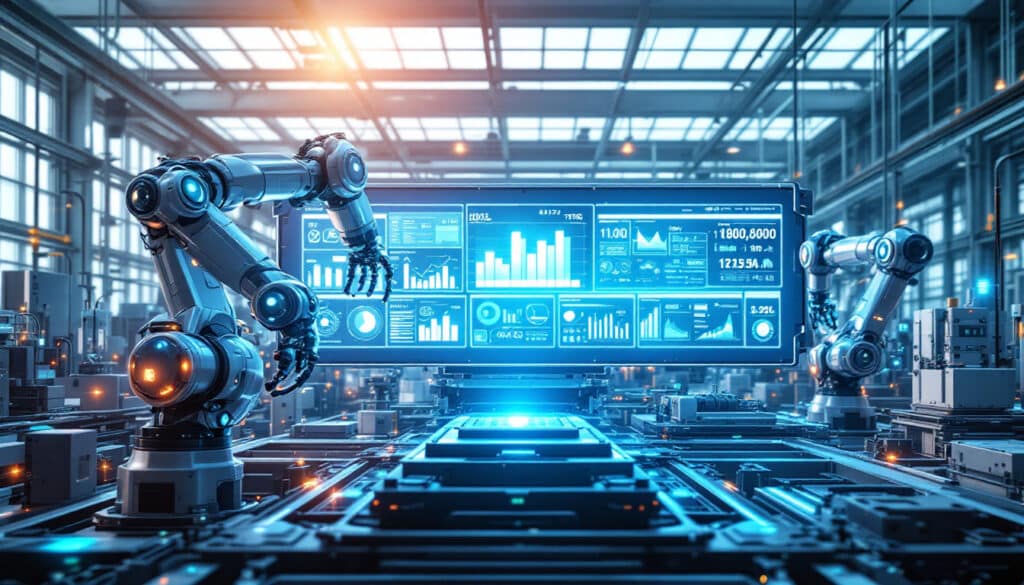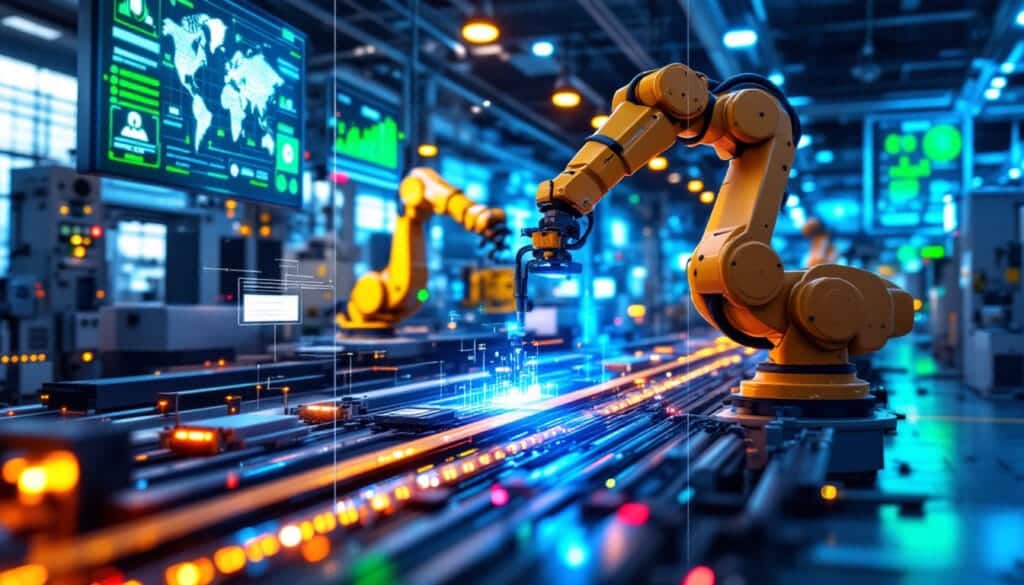Supply chains are evolving at a breakneck speed.New technologies are transforming every link in this complex web.Optimizing these processes has become a crucial issue for modern businesses.
In this context, data analysis plays a central role in enabling informed decision-making. Recent innovations provide solutions to enhance the resilience of supply chains in the face of global challenges. The integration of advanced systems allows for more efficient flow management and better responsiveness to unforeseen events. Industry professionals must thus continuously adapt to remain competitive.

Table des matières
ToggleWhat is Industry 4.0 and why is it essential for your workshop?
Industry 4.0 represents the fourth industrial revolution, characterized by the integration of digital technologies into manufacturing processes. This transformation allows for the creation of connected workshops, where machines, systems, and people communicate in real-time to optimize production. Adopting Industry 4.0 is crucial for your workshop as it improves efficiency, reduces costs, and increases flexibility in response to market demands.
By integrating advanced technologies such as the Internet of Things (IoT), artificial intelligence (AI), and automation, workshops can anticipate failures, optimize workflows, and customize products according to customer needs. For example, smart pumps illustrate how intelligent infrastructure is transforming manufacturing sectors by making equipment more responsive and autonomous.
The transition to Industry 4.0 is not only about technology but also about corporate culture. It is essential to train staff and rethink internal processes to fully leverage the benefits offered. By adopting this approach, your workshop can not only remain competitive but also become a leader in manufacturing innovation.
How can a smart connection transform your manufacturing processes?
A smart connection within your workshop enables smooth communication between different parts of the production chain. Thanks to IoT sensors, machines can transmit real-time data about their performance, status, and maintenance needs. This transparency facilitates the early detection of problems and minimizes unplanned downtime.
For example, NTT Data demonstrates how the continuous adaptation of AI technologies allows the transition from Industry 4.0 to 5.0, integrating more automation and decision-making intelligence. This results in more flexible and responsive manufacturing processes that can quickly adjust to demand fluctuations and product design changes.
Moreover, a smart connection fosters collaboration between different departments of the workshop, from design to production to logistics. This synergy improves coordination and reduces errors while allowing for better resource management and cost optimization.
What are the major benefits of Industry 4.0 for the manufacturing sector?
The adoption of Industry 4.0 offers numerous benefits for the manufacturing sector. Among the most significant are increased productivity due to the automation of repetitive tasks and process optimization. Connected machines can operate more efficiently, reducing waste and improving the quality of final products.
Another key advantage is the increased flexibility of production. Industry 4.0 allows for quick shifts from one type of production to another, which is particularly useful in a market where consumer demands are rapidly changing. This ability to adapt quickly is crucial for staying ahead of the competition.
Furthermore, Industry 4.0 promotes better data management. Information gathered throughout the manufacturing process can be analyzed to improve strategic decisions, anticipate market trends, and customize product offerings. For instance, IoT and AI applications allow for in-depth data analysis, thus facilitating continuous innovation and customer satisfaction.
What key technologies make up Industry 4.0?
Industry 4.0 relies on several key technologies that interact to create smart production environments. Among these technologies, the Internet of Things (IoT) plays a central role by connecting machines, sensors, and management systems to enable real-time communication and collaboration.
Artificial intelligence (AI) is also essential, as it enables the analysis of the vast amounts of data generated by connected equipment. With AI, workshops can predict future performance, optimize processes, and even automate preventive maintenance.
Additionally, advanced robotics and automation transform production lines by making operations faster and more precise. Collaborative robots (cobots) work alongside humans, thereby increasing production capacity without compromising quality. Finally, augmented reality (AR) and virtual reality (VR) are used for training, maintenance, and process optimization, offering enhanced visualization and interaction with production systems.
These technologies are often integrated through supply chain management platforms, such as those featured in the partnerships between UST and T-Works, which propel innovations in key sectors such as semiconductors and automotive.
How to integrate Industry 4.0 into your workshop: steps and best practices?
Integrating Industry 4.0 into your workshop requires a structured and strategic approach. The first step is to assess the current state of your infrastructure and identify areas where 4.0 technologies can bring significant improvements. This includes analyzing production processes, data management, and communication capabilities in your workshop.
Next, it is essential to define a clear strategy for adopting 4.0 technologies. This strategy should align business objectives with technical capabilities and include a detailed implementation plan. It may be helpful to collaborate with experts or specialized partners to ensure a smooth and effective transition.
Training and skill development for your staff are also crucial. Employees must be familiar with new technologies and understand how to use them to improve operations. Investing in continuous training ensures that your team is ready to make the most of 4.0 innovations.
Finally, it is important to start with pilot projects before rolling out technologies across the entire workshop. This allows for testing solutions, identifying potential issues, and adjusting the strategy based on the results obtained. For example, by implementing smart pump systems in a specific section of production, you can evaluate their effectiveness before deploying them on a larger scale.
What are the challenges and how to overcome them when transitioning to Industry 4.0?
The transition to Industry 4.0 is not without challenges. One of the main obstacles is the initial cost of the necessary technologies and infrastructures. Investing in connected equipment, AI systems, and cybersecurity solutions can represent a significant expense for many workshops. However, these investments are often recouped in the long run through productivity gains and reduced operational costs.
Another major challenge is the resistance to change within the organization. Some employees may be reluctant to adopt new technologies or alter their work methods. To overcome this resistance, it is crucial to clearly communicate the benefits of Industry 4.0 and provide adequate support during the transition, especially through training and awareness workshops.
Data security is also a significant concern. With increased connectivity, the risks of cyberattacks and data breaches rise. It is essential to implement robust security measures, such as data encryption, firewalls, and strict security protocols, to protect sensitive information in your workshop.
Finally, the lack of standardization and interoperability between different technologies can complicate the integration of 4.0 solutions. To address this issue, it is recommended to choose technologies and partners that adhere to open standards and offer compatibility with existing systems. Initiatives such as the BRICS discussions highlight the importance of international collaboration to develop common standards and facilitate the global adoption of Industry 4.0.





